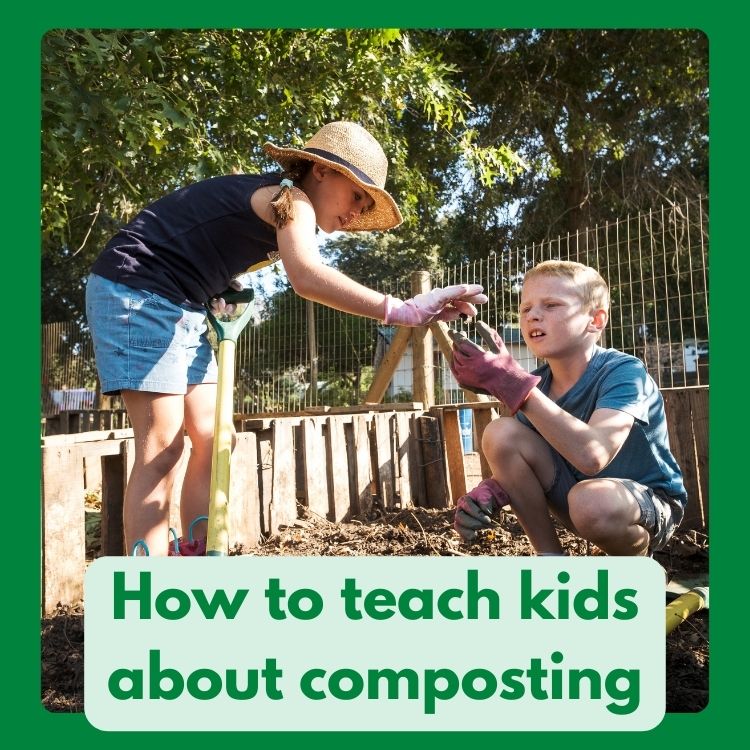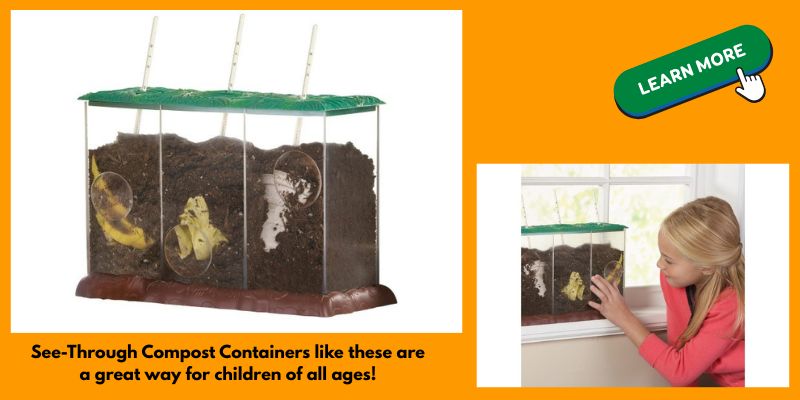Discover How to teach kids about composting and make it a fun, educational experience for the whole family. Life skill learned early on will have a huge impact.
As a parent or educator, you’re always looking for ways to teach good habits to kids.
Composting is a great practice. It helps reduce waste and teaches kids about taking care of the earth.
Starting composting early helps kids love nature more. It also shows them how their actions affect the environment.
Key Takeaways
- Composting is a simple and effective way to reduce household waste.
- Teaching children about composting promotes sustainability and environmental awareness.
- It’s a great way to spend quality time with kids while educating them on eco-friendly practices.
- Composting can be a fun and engaging activity for the whole family.
- It helps children understand the connection between waste and the natural world.
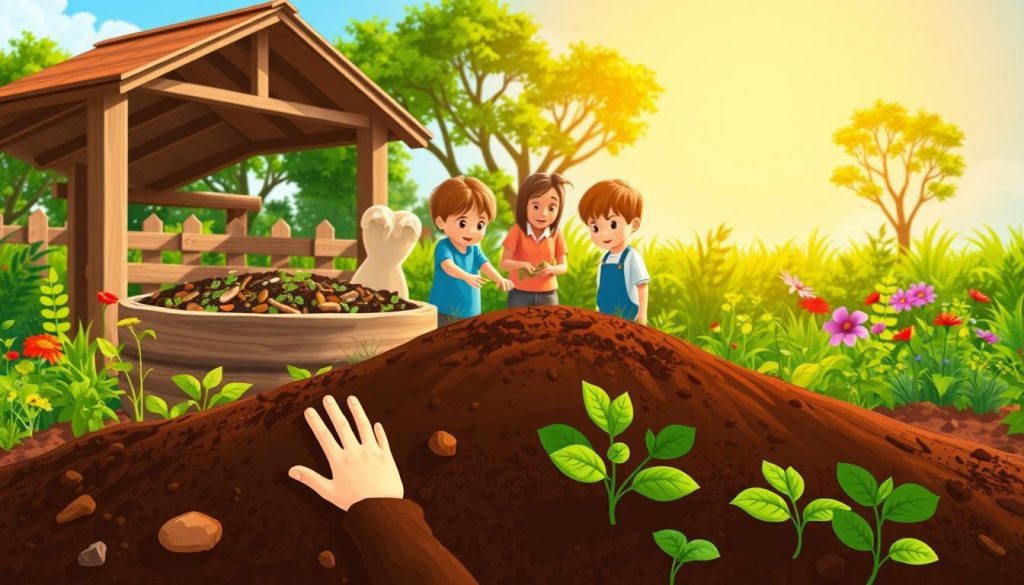
The Magic of Decomposition: What Kids Need to Know
Learning about decomposition lets kids see how waste turns into soil. This natural process is key for our planet. It teaches us about sustainability and life’s cycle.
What Is Composting and Why It Matters
Composting breaks down food scraps and yard waste into soil. It’s important because it cuts down on landfill waste. This waste can harm our planet.
By composting, we make soil that helps plants grow well. Teaching kids about composting shows them how to care for our planet.
Some key benefits of composting include:
- Reducing landfill waste
- Creating nutrient-rich soil for gardening
- Helping to combat climate change by reducing greenhouse gas emissions
The Science Behind Decomposition
Decomposition is done by tiny creatures like bacteria and fungi. They eat organic matter and break it down. This is vital for our ecosystem.
It makes nutrients available for plants. Knowing about decomposition helps kids see the importance of tiny life in our world.
| Decomposition Process | Role in Ecosystem | Benefit to Gardening |
|---|---|---|
| Breaking down organic matter | Nutrient cycling | Creates nutrient-rich soil |
| Involves microorganisms like bacteria and fungi | Supports plant growth | Improves soil structure |
Benefits of Teaching Kids About Composting
Teaching kids about composting is more than just managing waste. It’s about raising future environmental guardians.
By teaching them about composting, you help them see the world and their role in protecting it.
Environmental Awareness and Responsibility
Teaching kids about composting boosts environmental awareness and responsibility. It shows them how their actions affect the planet. This helps them feel a sense of duty to reduce waste.
Developing Life Science Skills
Composting is a great way to teach life science. Kids learn about decomposition, microorganisms, and nutrient cycles.
These are key to understanding biology and ecology.
Reducing Household Waste
By getting kids involved in composting, you teach them a valuable skill. It turns waste into something useful.
This shows them the power of recycling and reusing materials.
Here’s a simple comparison of the benefits of composting education:
| Benefits | Description | Impact |
|---|---|---|
| Environmental Awareness | Understanding the importance of reducing waste | Fosters a sense of responsibility towards the planet |
| Life Science Skills | Learning about decomposition and nutrient cycles | Enhances understanding of biological processes |
| Waste Reduction | Turning waste into a valuable resource | Decreases landfill waste and promotes sustainability |
By teaching kids about composting, you equip them to make a positive environmental impact. It’s a simple yet powerful way to teach them about being eco-friendly and sustainable.
Preparing to Teach Kids About Composting
Before you start teaching kids about composting, get ready with the right mindset. Learn the basics of composting and how to make it fun for kids. This way, you’ll make learning about composting a fun and educational experience for them.
Age-Appropriate Approaches
It’s important to adjust your teaching method based on the kids’ age. Younger kids can enjoy sorting compostable materials. Older kids can learn more about the science behind composting. Easy composting activities can be made for all ages, so everyone can learn and have fun.
Gathering Necessary Materials
To begin teaching kids about composting, you’ll need some materials. You’ll need a compost bin, gloves, a shovel, and things like fruit and vegetable scraps. Having the right tools and materials will make the experience more fun and help kids understand composting better.
Setting Up a Dedicated Space
Creating a special space for composting is key. It should be easy for kids to get to and let them watch and help with composting often. By making a fun and interactive composting area, kids will be more excited to help and learn about taking care of the environment.
By following these steps and using fun ways to introduce composting to children, you can make a great composting program for kids.

How to Teach Kids About Composting: Step-by-Step Guide
Teaching kids about composting is a great way to teach them about waste management and nature. It’s a skill that helps the environment and teaches kids about life’s cycle.
By following a simple guide, you can make learning fun and educational.
Introducing the Concept Through Stories and Videos
Start by using stories and videos to introduce composting. This helps kids grasp the basics of decomposition and why composting is important.
There are many online resources, like children’s books and documentaries, that explain it in a way kids can understand.
For instance, a story about a character starting a compost pile can spark their interest. Then, a video showing how composting works can help clarify it further.
“Composting is nature’s way of recycling. It’s a process that turns waste into a valuable resource for our gardens and the environment.”
Hands-On Demonstrations of Compostable vs. Non-Compostable Items
Once kids get the basics, it’s time for hands-on learning. Sort household items into compostable and non-compostable groups.
This teaches them what can and can’t be composted and the value of proper waste sorting.
| Compostable Items | Non-Compostable Items |
|---|---|
| Fruit and vegetable peels | Plastic packaging |
| Eggshells | Metal cans |
| Coffee grounds | Glass bottles |
Creating a Simple Composting System Together
After learning what can be composted, it’s time to set up a composting system. Start with a small bin or a DIY setup using a plastic container or a wooden pallet bin.
Let your kids help with setting it up and choosing materials.
Working together to keep the compost pile going teaches kids about responsibility and regular maintenance.
This hands-on experience helps them understand composting better.
As you guide your kids through these steps, you’re not just teaching them about composting. You’re also teaching them to care for the environment, a lesson that will last a lifetime.
Fun Composting Activities for Different Age Groups
Composting is a great way to teach kids about taking care of the environment. It’s fun and educational for all ages.
You can find the perfect composting activity for preschoolers, elementary school kids, or even tweens and teens.
Preschoolers (3-5 years)
For little ones, composting can be a fun game. You can make a composting sensory bin with leaves, vegetable scraps, and soil.
This lets them feel and learn about decomposition.
Also, singing composting songs or reading stories can spark their interest. It shows them how waste can become something useful.
Elementary School Children (6-10 years)
Older kids can do more with composting. They can keep a composting journal to watch how things break down. They can also sort out what can and can’t be composted.
Helping them set up a worm bin is a great way to teach them. It makes them more interested in composting.
Tweens and Teens (11+ years)
Teenagers can really help out with composting. They can watch over and care for a compost pile. They’ll learn about the science behind it, like how microorganisms work.
They can even design their own composting projects. This teaches them about sustainability and caring for the environment.
By getting kids involved in composting, you’re teaching them about sustainability. You’re also helping make the world a healthier place for the future.
Composting can be a rewarding experience for kids of all ages.
Indoor Composting Projects for Kids
You can compost indoors with your kids using simple methods. It’s fun and teaches them about waste reduction and sustainability.
This way, kids can help with environmental conservation right at home.
Worm Bins (Vermicomposting)
Vermicomposting, or composting with worms, is an intriguing way for kids to learn. You’ll need a worm bin, which you can buy or make. Fill it with shredded newspaper, add red wiggler worms, and include kitchen scraps.
Kids can watch the worms work and learn about decomposition. It’s a hands-on way to understand how things break down.
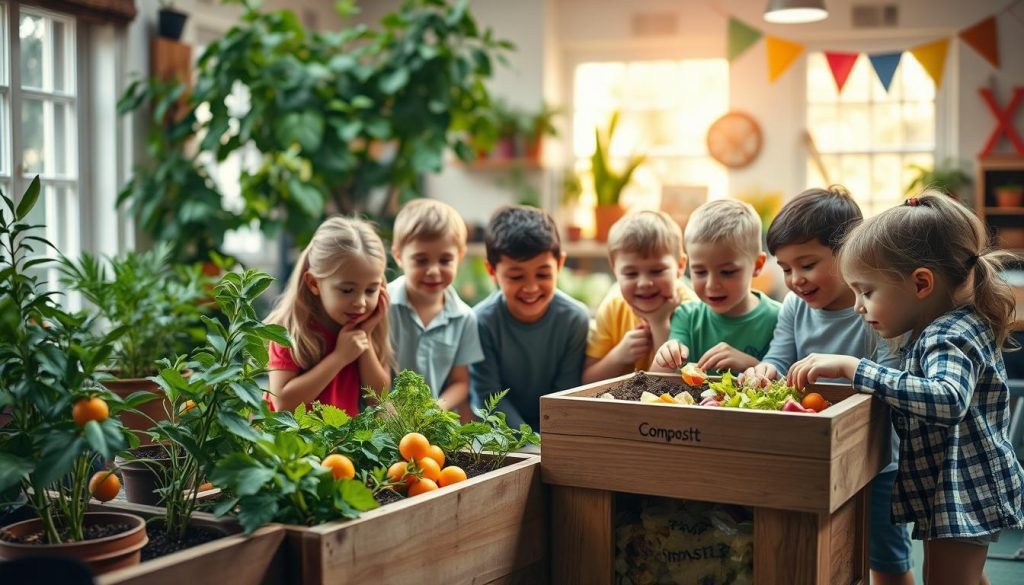
Countertop Composting Systems
Countertop composting systems are great for indoor composting. They’re small and sit on your kitchen counter. They use filters to keep odors down, making them perfect for inside.
Kids can help sort waste and watch the system work. It’s a controlled way to learn about decomposition.
Window Sill Decomposition Experiments
For a simple experiment, try decomposition on your window sill. Put organic waste like fruit peels in a jar. Watch as it breaks down over time.
This method is perfect for introducing kids to decomposition. They can see how organic materials change naturally.
Outdoor Composting Adventures with Children
Getting your kids involved in outdoor composting can help them appreciate nature more. It’s a fun way to teach them about reducing waste and making soil for your garden.
Building a Backyard Compost Bin Together
Building a compost bin is a great first step. You can buy one or make it from pallets or wire mesh. Let your kids help with the design and building.
It teaches them about composting and makes them feel responsible.
When building, talk about aeration, moisture, and the right mix of materials. Explain these ideas simply so your kids can understand.
You can say the bin is like a “food recycler” that turns waste into something useful.
Collecting and Adding Materials as a Family Activity
Going on a walk to collect compost materials is fun. Teach your kids what can and can’t be composted. Let them sort the materials into different piles.
Encourage your kids to find creative materials like kitchen scraps or shredded paper.
This teaches them about different compost materials and the value of reducing waste.
Monitoring and Turning the Compost Pile
After setting up the bin, it’s important to check on the compost. Teach your kids to monitor temperature, moisture, and smell. Let them help turn the pile to ensure everything breaks down well.
This helps them learn about decomposition and the importance of patience. By being involved, they gain a deeper understanding of composting and feel proud of their work.
Safety First: Composting Precautions for Kids
When you start composting with your kids, safety is key. Composting teaches kids about being green and reducing waste. But, it’s important to know the risks and keep the composting area safe and clean.
Proper Handwashing and Hygiene
Keeping hands clean is a big part of composting safety. Make sure kids wash their hands well with soap and water after touching compost.
This stops germs from spreading.
- Teach kids to wash their hands for at least 20 seconds.
- Use warm water and soap to effectively clean hands.
- Make handwashing a fun and engaging part of the composting process.
Adult Supervision Guidelines
Adult supervision is crucial when kids are composting. Adults should watch over to make sure kids are safe and doing things right.
Here are some tips for adult supervision:
- Be present during composting activities, specially when handling dangerous materials.
- Guide children on how to correctly add materials to the compost pile.
- Monitor the composting area to prevent accidents and ensure it’s kept clean.
By following these safety tips, you can make composting a fun and educational experience for your kids. They’ll learn important lessons about taking care of the environment.
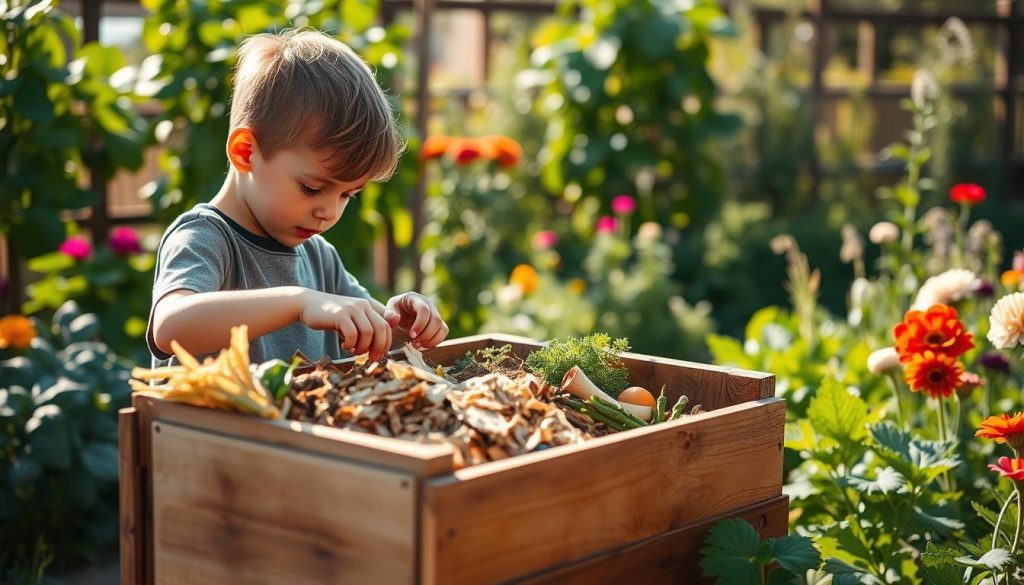
Seasonal Composting Activities for Year-Round Learning
Make composting a fun adventure for your kids all year round. You can do this by trying different projects and activities.
It keeps them interested and teaches them about composting and being green.
Spring and Summer Composting Projects
In spring and summer, kids can help with outdoor composting activities. They can build a compost bin in the backyard or collect materials.
These tasks help them learn about how waste breaks down and the value of recycling.
Some fun activities for kids during these seasons include:
- Creating a compost pile with grass clippings and leaves
- Adding kitchen scraps to the compost bin
- Monitoring the compost pile’s temperature and moisture
Fall and Winter Composting Opportunities
In the fall and winter, kids can try indoor composting projects. They can do worm composting or use countertop composting systems. These activities teach them about different composting methods and how to cut down on waste.
| Season | Composting Activity | Learning Opportunity |
|---|---|---|
| Spring | Building a backyard compost bin | Decomposition process, recycling organic waste |
| Summer | Collecting materials for composting | Identifying compostable materials, waste reduction |
| Fall | Vermicomposting (worm composting) | Indoor composting methods, worm biology |
| Winter | Countertop composting systems | Indoor composting methods, convenience |
Incorporating Composting into Educational Activities
Teachers can make learning fun by adding composting to the classroom. It teaches kids about taking care of the environment.
Plus, it’s a way to learn many subjects at once.
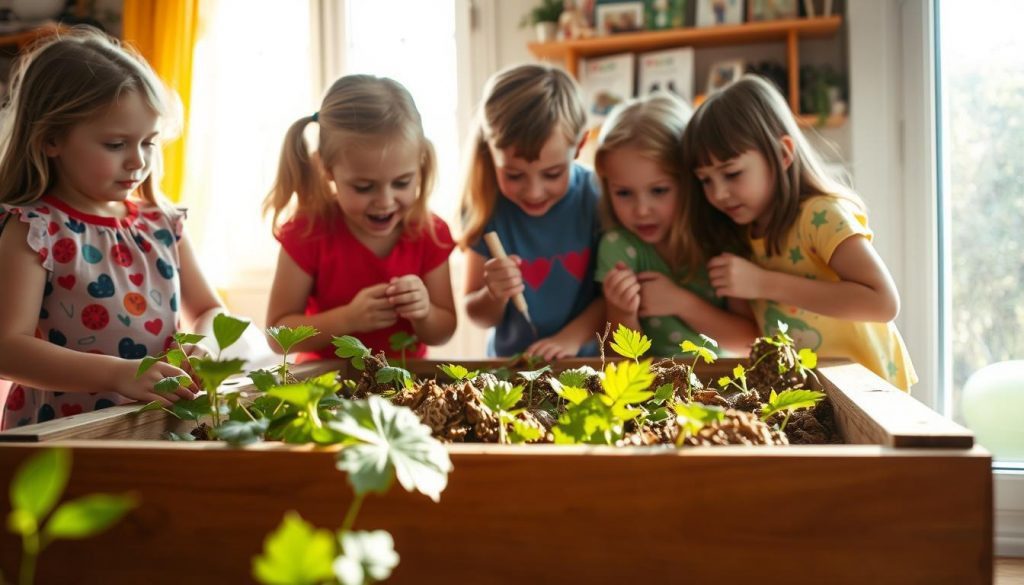
Science Experiments with Compost
Composting helps teach science in a fun way. Kids can see how plants grow better in composted soil. They learn about decomposition and the role of tiny living things.
They can also see how different things break down at different speeds.
This teaches them about the composting process and its needs.
Art Projects Using Compostable Materials
Art projects with compostable materials are a great way to teach kids about composting. They can make art using leaves, twigs, and food waste.
This shows them the beauty of nature and composting.
These projects boost creativity and show how art and nature are connected. It’s a fun way to learn about the environment.
Math and Measurement Activities
Composting also teaches math skills. Kids learn to measure and track changes in the compost pile. They figure out the right mix of materials needed.
These activities make math real and interesting.
They help kids understand numbers and science through composting.
Using Finished Compost with Kids
Using finished compost is a rewarding experience for kids. It teaches them about recycling and sustainability.
It shows them how their composting efforts help the environment and make gardens healthier.
Growing Plants in Compost-Enriched Soil
Mix the finished compost into the soil for planting flowers, vegetables, or herbs. Compost enriches the soil with nutrients, making it better for plants.
This activity lets kids see how composting helps plants grow.
| Plant Type | Growth in Regular Soil | Growth in Compost-Enriched Soil |
|---|---|---|
| Tomatoes | Slow, less fruit | Faster, more fruit |
| Marigolds | Less vibrant | More vibrant, healthier |
| Basil | Weaker stems | Stronger stems, more leaves |
Observing the Garden-to-Table Cycle
Kids can see the garden-to-table cycle by growing plants with compost. They watch seeds sprout, grow, and become food for the family. This teaches them about food origins and sustainable gardening.
Expanding Beyond Home: Community Composting with Kids
As you and your kids get better at composting at home, it’s time to join your community.
This step boosts the environment and teaches your kids about teamwork and responsibility.
Community composting lets kids see the value of working together and caring for the planet.
By starting or joining local projects, you and your kids can help make the world greener.
School Composting Programs
Many schools now teach composting as part of their lessons. School composting programs are a great way to link your child’s home composting with school. It’s a chance to learn about science and helping the environment.
Students help collect food waste, take care of the compost, and use it in school gardens. This hands-on work teaches kids about science, teamwork, and responsibility.
Community Garden Involvement
Community gardens are another great place for kids to help with composting. These gardens often need volunteers to help with composting.
By helping in a community garden, your kids see how composting helps the garden grow.
They also learn about the value of community spaces and working together.
| Benefits | School Composting Programs | Community Garden Involvement |
|---|---|---|
| Environmental Education | Teaches kids about composting and sustainability | Shows the practical application of composting in gardening |
| Community Engagement | Fosters teamwork and collaboration among students | Brings together community members around a shared goal |
| Skill Development | Develops responsibility and scientific knowledge | Teaches gardening skills and the importance of composting |
“The earth has enough for everyone’s need, but not enough for everyone’s greed.” – Mahatma Gandhi. This quote shows why community composting is so important for our planet’s future.
Troubleshooting Common Composting Challenges with Kids
Composting with kids can face some common issues. But, with the right strategies, these problems can be solved. It’s a great way to teach kids about sustainability and how waste breaks down.
Addressing Odors and Pests
Odors and pests are common problems in composting. To cut down on odors, mix “green” and “brown” materials well. Turning the compost often and adding straw or newspaper helps too.
To keep pests away, don’t add meat, dairy, or oils to your compost.
Maintaining Interest Over Time
To keep kids interested, make composting fun and ongoing. Set up a routine, like adding scraps daily or turning the pile weekly.
You can also try easy composting activities like keeping a journal or checking the compost’s temperature.
Dealing with Mistakes and Learning Opportunities
Mistakes happen in composting, but they’re great for learning. When something goes wrong, teach kids about composting and how to fix it.
Encourage them to observe, guess, and try new things. This helps them understand decomposition and sustainability better.
Conclusion
Now that you’ve learned how to teach kids about composting, it’s time to start. By teaching your children about composting, you’re teaching them a valuable skill. You’re also teaching them to care for the environment.
There are many fun ways to introduce composting to kids. You can create a simple composting system or go on outdoor composting adventures together.
Making composting a family activity helps create a lifelong habit that benefits both your children and the environment.
As you start composting with your kids, be patient and encouraging. Be open to learning together. With time and practice, your children will grow to love and respect the natural world.
They will also understand the importance of reducing waste.
So, begin your composting journey today. Watch as your kids grow up in a more sustainable and environmentally conscious world.
FAQ
What is the best way to introduce composting to children?
How can I make composting fun for kids?
What are some easy composting activities for kids?
How can I teach kids about the science behind composting?
What are some safety precautions to take when composting with kids?
Can I compost indoors with kids?
How can I maintain kids’ interest in composting over time?
What are some ways to incorporate composting into educational activities?
My final thoughts
Teaching kids about composting at home is a fun, hands-on way to spark lifelong habits that benefit them and the planet!
Composting turns food scraps and yard waste into nutrient-rich soil, showing kids how everyday actions can reduce waste and support nature.
By getting their hands dirty, they learn science in action—think decomposition, ecosystems, and nutrient cycles—making learning exciting and real.
It’s like a backyard adventure that doubles as a biology lesson!
Composting also builds responsibility and teamwork.
Kids feel proud pitching in, whether tossing veggie peels into the bin or turning the pile with family.
These small tasks teach them that their efforts matter, boosting confidence and a sense of purpose.
Plus, they see the results when plants thrive in composted soil, connecting their actions to tangible outcomes.
The positive effects ripple far beyond the backyard. Composting nurtures environmental awareness, helping kids understand how reducing landfill waste fights climate change.
They grow up valuing sustainability, making mindful choices like recycling or conserving resources. It also sparks creativity—kids might dream up ways to repurpose scraps or design mini-gardens.
These lessons shape them into problem-solvers who care about their community and world.
Best of all, composting is quality family time! Laughing over worm discoveries or planting together builds memories and bonds.
By learning to compost, kids gain practical skills, a love for nature, and a can-do attitude that’ll inspire them for years. It’s a small step with big, joyful rewards!
Check out our article on Kitchen Waste and make a start today!

